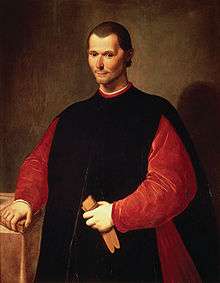Machiavellian intelligence

- Niccolò Machiavelli, The Prince
In cognitive science and evolutionary psychology, Machiavellian intelligence is the capacity of an entity to be in a successful political engagement with social groups. The first introduction of this concept to primatology came from Frans de Waal's book "Chimpanzee Politics" (1982), which described social maneuvering while explicitly quoting Machiavelli. Also known as machiavellianism, it is the art of manipulation in which others are socially manipulated in a way that benefits the user.
Machiavellian behaviors
Machiavellian intelligence may be demonstrated by behaviors including:
- Blaming and forgiveness;
- Lying and truth-telling;
- Making and breaking alliances;
- Making and breaking promises;
- Making and breaking rules;
- Misleading and misdirection.
Criticisms
Food and nutrient factors
The claim that large brains are linked to large social groups in primates and cetaceans, on which the Machiavellian intelligence hypothesis is based, is criticized by a number of researchers for overlooking the availability of food as a common limiting factor for brain size and social group size. Among primates as well as cetaceans, there are some opportunistic species that eat most types of food and other species that are specialised in particular types of food, as well as differences in the overall availability of food between different geographical regions in which the animals live. Some critics of Machiavellian intelligence argue that species that have to keep their use of nutrients down due to food poverty or specialisation in a rare type of food lowers average brain size for species that live in smaller groups, making big brains falsely appear to be linked to large groups due to the common causes of opportunistic foraging for nutritious food and a rich supply of food. These critics also cite that the "exceptions" in the form of small-brained primates in very large groups typically eat abundant but nutrient-poor foods (such as geladas that eat grass), as predicted by the food-based model, and argue that the higher individual need for nutrients put on by large brains causes groups to become smaller if the species have the same degree of digestive specialisation and environmental availability of food.[1][2]
Another criticism that relates to food regards the assumption that modern hunters and gatherers are living in marginal environments displaced by farming peoples and that people in paleolithic times supposedly lived in larger social groups than hunters and gatherers do today. The researchers who put forward that criticism cite observations that hunters and gatherers often trade with farmers who live nearby and/or steal food from them, opportunities that were not available before agriculture was invented. The critics therefore argue that our prehistoric ancestors before agriculture lived in even smaller groups than hunters and gatherers do today, in groups smaller than those of the most opportunistic non-human apes as a result of the greater requirement for nutrients in human brains.[3][4]
Complex social groups without intelligence
Some researchers criticize the Machiavellian intelligence hypothesis from observations of social insects that form societies that are organized and yet have very small brains. Some of these insects, such as Jack jumpers and paper wasps have hierarchical societies in which each individual treat every other in accordance with their status, as opposed to the disorganized herds as which the Machiavellian intelligence hypothesis depict social animals with small brains.[5][6]
History
The term refers to Niccolò Machiavelli's The Prince (1513) and to the hypothesis that the techniques which lead to certain kinds of political success within large social groups are also applicable within smaller groups, including the family-unit. The term "everyday politics" was later introduced in reference to these various methods. These arguments are based on research by primatologists such as Nicholas Humphrey (1975).
See also
References
- ↑ Primate brain size is predicted by diet but not sociality - 2017, Alex R. DeCasien, Scott A. Williams & James P. Higham https://www.nature.com/articles/s41559-017-0112
- ↑ Evolution: Eating away at the social brain, Chris Venditti https://www.nature.com/articles/s41559-017-0122
- ↑ Hunter-Gatherers: An Interdisciplinary Perspective - 2001 edition, Catherine Panter-Brick, Robert H. Layton, Peter Rowley-Conwy
- ↑ Barely Surviving or More than Enough?: The environmental archaeology of subsistence, specialisation and surplus food production - 2013, Maaike Groot, Daphne Lentjes, Jørn Zeiler
- ↑ Ants at Work: How an Insect Society is Organized - 1999, Deborah M. Gordon
- ↑ Insects, Science & Society - 2012, David Pimentel
Further reading
- Carlson, N.R., et al. (2007). Psychology: The Science of Behaviour - 4th Canadian ed.. Toronto, ON: Neil R. Carlson.
- Humphrey, N. K. (1976). The social function of the intellect. In P. P. G. Bateson & R. A. Hinde (eds.). Growing points in ethology. Cambridge: Cambridge University Press
- Byrne, R. W., & Whiten, A. (1988). Machiavellian intelligence. Oxford: Oxford University Press
External links
- Michael Walzer, Political Action: The Problem of Dirty Hands (PDF), Institute for Advanced Study